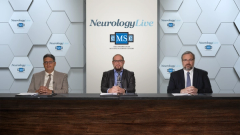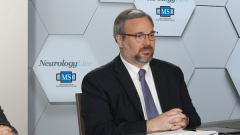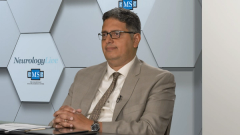
Novel Mechanisms of Action for Multiple Sclerosis Treatment
Drs Hesham Abboud and Benjamin Greenberg share their excitement for the future of multiple scelrosis treatment and comment on emerging therapies and novel mechanisms of action.
Episodes in this series

Hesham Abboud, MD: From the immunomodulation standpoint, one of the things that we've seen in NMO, interleukin 6 inhibitors, I know they're being trialed in MS. That's something I’m looking forward to. Interleukin 17. And then most importantly, non-immunomodulating. Remyelinating agents I know it's been a while and they are in clinical trial for a while, but that's something I’m interested in, is neurological restoration of function. We're hoping that we'll see more success in remyelination soon. This is the next step in MS management.
Ahmed Obeidat, MD, PhD: That's a huge unmet need, right? Our patients come in and ask us, what have you guys done for remyelination? I’m like, we haven't yet. We're trying, right? This is a major concept. And remyelination and neuroprotective treatment trials, they're hard to design. And this is where we're missing some small signal related to imperfection in trial design, which is a problem that we have all the time, right? Dr Greenberg, what are you excited most about with the upcoming trials other than BTKi?
Benjamin Greenberg, MD: No, I agree on the remyelination, neuroprotection, there are multiple agents that are in trials right now. We've been involved in a series of phase 1 trials for both neuroprotection, remyelination and it's exciting to see it happen. You're right. They are difficult trials to do. But the other category that's interesting, and we're starting to see them pop up, are non-immunosuppressive interventions to changing the adaptive immune system. And I'm going to use a term in an overly broad way, but tolerance induction in the immune system. Seeing these trials move forward are targeted immune therapies where we don't get off targeted effects. We don't block a single cytokine pathway, or a single cell gets depleted, but in a much more tailored way, we remove the autoreactive portion of the immune system or just suppress that portion, such that people can move forward without relapses, but without having immunosuppression or needing an immune remodeler in order to get there. And when you look around at our armamentarium right now, I think we are quite good at stopping relapses. We're exceptionally good at stopping relapses. All you must do is take an MS practice that's been open for over 20 years and chart the number of phone calls per month, relative to relapses or the number of steroid doses. And it's gone down. Every 5 years it's gone down because we do a great job of suppressing relapses. The long-term disability, the rates of progression, they're still not getting there. And the safety phone calls, the concerns about infections, concerns about monitoring. Those have taken up a huge space. If we could have a therapy that was just as good at preventing the relapses but didn't come with the additional baggage of immunosuppression, that would be huge. And we're seeing these trials move forward. If I had to, I agree with you that one of the biggest unmet needs, or at least what I hear from my patients is on restoration of function must be number one on the list for unmet needs. I still think that a very close second in our unmet need is around personalized medicine, around being able to pick a drug for a specific patient based on either a prognostic about them or a real-time readout on, are they responding to the medication or not? And I am unaware that if there's any large-scale trial going on, they're doing it in drug-specific ways. But if we had to add anything to the list of what I'd like to see, it'd be a bigger investment in getting to that personalized medicine approach. And instead of doing the shared decision-making model, which I love, I'd love to do a blood test and tell a patient you should take drug X or avoid drug X, because it's not going to work. Either one of those would help me limit that conversation. There's a lot that's out there that's very exciting and hopefully, more we can add to the list.
Ahmed Obeidat, MD, PhD: Yes. I'm glad we are now talking. We've done so well in relapses control and MRI activity control. And now we have the luxury of talking about precision medicine in MS. And maybe some other out-of-the-box approaches like T-cell therapy or something like this, where now we are seeing even becoming a reality in trials and being tested. With the recent, also interesting data on epstein-barr virus, right? And now maybe there might be an antiviral coming in to be tested in MS. There's so many exciting parts and they're moving parts that I would say they're hopeful parts. And maybe one day I always think about, are we going to have combination therapy in MS? And that's one of the things we touch on in BTK inhibitors say, do we have combination therapy or not? And for now, we don't. But maybe in the future, we could combine now immune modulator with something else, like a neuroprotective agent or a remyelinating agent, or maybe with an antiviral. Who knows? These are things that’d be coming.
Transcript Edited for Clarity
Newsletter
Keep your finger on the pulse of neurology—subscribe to NeurologyLive for expert interviews, new data, and breakthrough treatment updates.














